Being in a foreign country is a disorienting feeling. Your understanding of society suddenly shifts. You have to reassess every part of your routine, and your comprehension of the rules of conduct revert to that of a child’s. If you are a smart and decent person you grapple with this dissonance, match speed and learn, and if you don’t you withdraw and view it from a safe distance. Fran Rubel Kuzui’s Tokyo Pop is a movie about the former, and thanks to a wonderful restoration by Indiecollect and a new Blu Ray release by Kino Lorber, it’s finally getting its due.
Tokyo Pop tells the story of a young punk named Wendy (played by Carrie Hamilton), living down and out in New York’s East Village in the 1980s. She gets an invite from a friend living abroad in Tokyo to come and visit, and having no prospects, a failing band and a shitty boyfriend, leaves with no plan and barely any money. She arrives to find that her flaky friend has already booked it, stranding her in Japan and forcing her to take gigs at a hostess bar to make enough money to survive. Along the way she meets Hiro, wonderfully played by Diamond Yukai, an unsuccessful rocker in a failing band who is avoiding taking over the family’s food model business. Hiro, after misreading both some cues and some English, invites her to a love hotel with goofy consequences. The two eventually reconcile, fall in love, and she joins their band as a singer. The novelty of a band fronted by a foreigner propels the band to flash in the pan fame, but in a way that complicates their relationship and unearths the complexities of Wendy’s place in Japan.
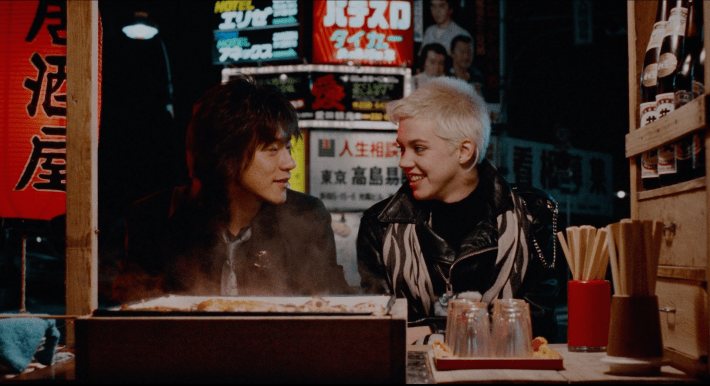
It’s kinda hard to bring this subject up without bringing up Lost In Translation, both for their thematic similarities and because Diamond Yukai is in both of these films: He co-stars in Tokyo Pop and plays the exuberant “Suntory Times'' director in what is indisputably Lost In Translation’s most iconic scene. One of the main differences between Lost in Translation and Tokyo Pop is that I kinda hate Lost In Translation. I think most people fondly remember the Bill Murray whisky commercial scene, the one fashion photographer who likes Roger Moore and then blank out the subsequent hour and thirty minutes. Having rewatched it I can say that while I understand the appeal to mopey early 2000’s film nerds, it’s stiflingly boring and debatably pretty racist.
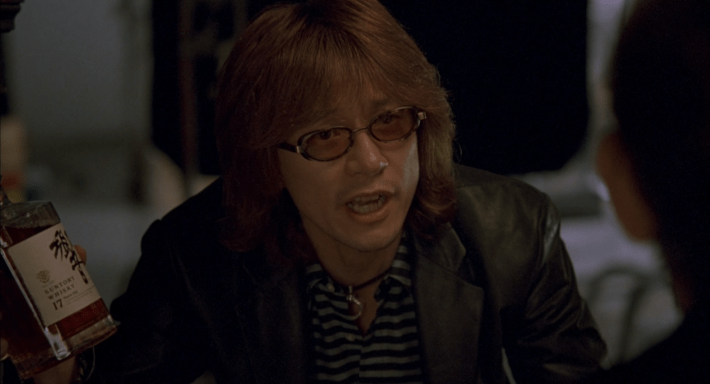
To its credit it has a phenomenal soundtrack, a great scumbag performance by Giovanni Ribisi and some pretty but ultimately sterile shots of Tokyo. You are mainly watching two divorce-adjacent Skyrim NPCs pathing through the Park Hyatt Tokyo and Shibuya without interacting significantly with Japanese people aside from going to one party and doing karaoke. They’re dull, incurious, comfortable LA people. If you want a narrative about disjointed depression in a foreign country, Pen-Ek Ratanaruang’s Last Life In The Universe co-starring Tadanobu Asano is eerie, heartbreaking, shot by the cinematographer of In The Mood For Love at his peak, and features one of the best ambient soundtracks ever. Hell, even Tom Selleck’s Mr. Baseball does a better job at attempting to reconcile with the complexities of being a foreigner in Japan. Lost In Translation has always felt like tourist shit, which is both the point and exactly why I find it so grating. “Let’s never come here again” Scarlett Johansson says peering down at the city “‘cause it would never be as much fun.”
Tokyo Pop does not have this issue because it is not just about being an outsider leering in. The recently restored Party Girl starring Parker Posey as a New York City 90s-raver-turned-librarian does a similar trick. In both cases, there is an intimacy and familiarity with the topography and subject material that cannot be faked, a basic subconscious understanding of the rhythm of both these places. Little details add up, like Wendy attempting and failing to get a cab after the subways close, the weird menagerie of other foreigners staying at her ryokan, or her having a helpful salaryman courteously explaining the phone card system to her.
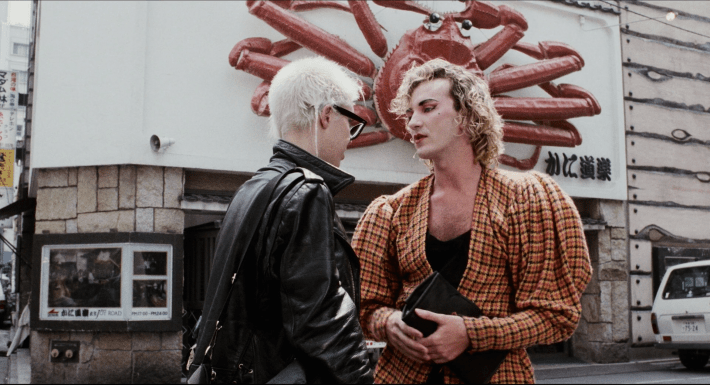
Such verisimilitude is a rare feat now, let alone in a goofy romcom from 1988. If it had absolutely nothing else going on for it, Tokyo Pop would be worth watching just for the sheer number of gorgeous shots of 1980’s bubble economy Japan: beautiful neon lightscapes, the iconic, massive mechanical crab sign of the chain Kani Doraku, the iconic chef sign of Kappabashi, shots of Rockabilly dancers in Yoyogi Park, even a shithole, rundown Japanese Dunkin’ Donuts that you can smell through your TV. Adding to this are tiny little cameos by X Japan, tiny indie acts like Kotogawa Rin Making Love and Papaya Paranoia, and wrestlers Bull Nakano and Aja Kong. Hell, even the brief section set in New York City’s East Village feels true to the time, proven by the fact that Keith Haring hand drew the logo and opening credits to this movie (director Fran Rubel Kuzui and her husband Kaz Kuzai helped Haring establish the Tokyo branch of his Pop Shop in Aoyama).
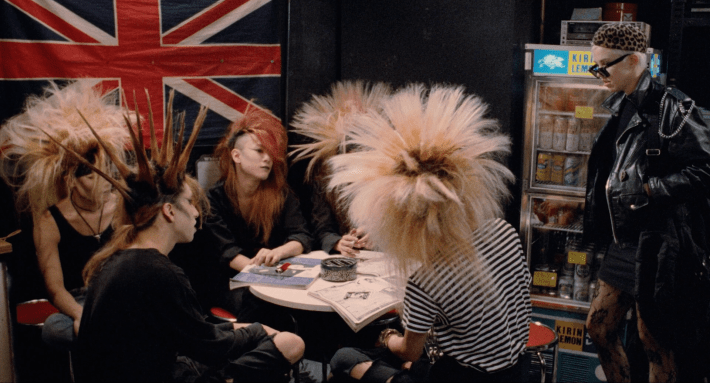
But what elevates Tokyo Pop above the ranks of a fluffy indie comedy is that there are real stakes for both Wendy and Hiro. It attempts to grapple with issues of identity within the breezy framework it has set up. Wendy’s status as a gaijin immediately pigeonholes her at the hostess bar, where drunk factory owners applaud each other for practicing English with her while she sings Home on the Range at karaoke. But because she is a novelty, she is also better paid than the other girls, and that novelty extends to her whole life there. When Hiro brings her to a rock club, she gets in for free. “Gaijin don’t pay” Hiro tells her.
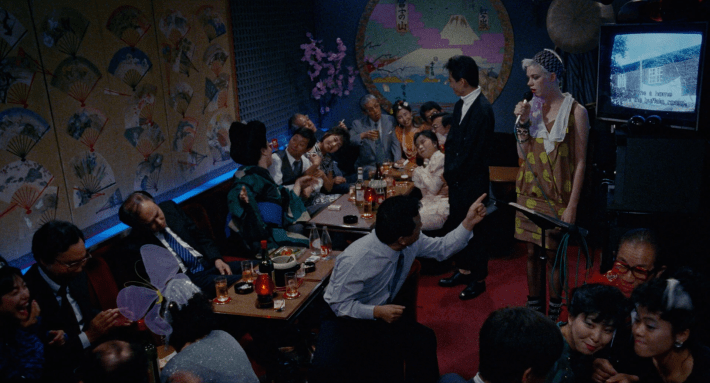
Hiro himself is initially attracted to Wendy partially because of what she represents: Rock & Roll, itself the most American thing possible. When Hiro asks his mother for the best Japanese shrine to show Wendy she responds “You’re finally interested in Japan…instead of American things!” Wendy joining Hiro’s band as a singer is both a blessing and a curse. The novelty of a foreigner co-fronting the band paired with Wendy brazenly barging into the office of record producer Mr. Dota (Tetsurō Tamba) lands them their big break. A subsequent photo op of Wendy scowling at a wrestler propels them into the headlines. But instead of Rock and Roll, they are playing corny novelty covers of American pop hits like Do You Believe in Magic and (You Make Me Feel Like) A Natural Woman. They do a press circuit, end up on the cover of Brutus, get the most 80’s apartment I have ever seen in my life, and start shilling for Toto washlet ads. Both are in love but unsatisfied. Hiro wants to sing songs that are about himself, specifically Japanese songs. Wendy wants to be viewed as something aside from a flash in the pan, to be judged on her own talent, and not to be consumed by Japan’s fickle music industry. This arrangement is unhealthy for both of them. “This isn’t Rock & Roll”, Wendy says, “this is Tokyo Pop.”

Tokyo Pop was not a breakout hit. Fran Rubel Kuzui would later end up gaining notoriety for directing and funding the Buffy The Vampire Slayer movie and, with her husband Kaz Kuzui, started a production company called Kuzui Enterprises that handles distribution for Japanese films in America and vice-versa (funny enough, Fran and Kaz are executive producers of the aforementioned Last Life In The Universe). But despite remaining in obscurity, not even getting anything beyond a Laserdisc release until now, this new restoration feels like an unearthed slice of history. Tokyo Pop is a unique gem; a breezy, often cheesy, slice of a Japan that does not exist any more, a romcom that often surprises by occasionally punching well above its weight. It is a film about the process of being plunged headfirst into a culture you don’t know and attempting, earnestly and embarrassingly, to actually live it, instead of simply staring at it blankly from the penthouse of the Hyatt.
Tokyo Pop is available now on Blu-ray and streaming.


